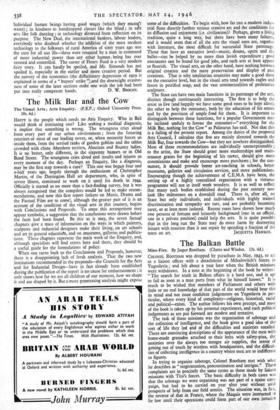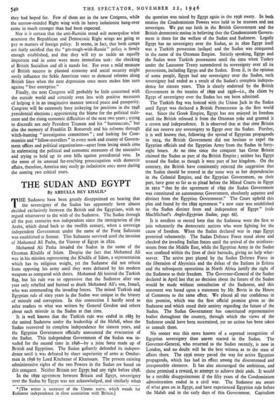The Balkan Battle
Miss-Fire. By Jasper Rootham. (Chatto and Windus. 12s. 6d.)
COLONEL ROOTHAM was dropped by parachute in May, 1943, to act as a liaison officer with a detachment of Mihailovitch's forces in Yugoslavia ; and left about a year later when the British missions were withdrawn. In a note at the beginning of the book he writes: "The search for truth in Balkan affairs is a hard one and is apt to fail as soon as a man parts from what he himself knows." It much to be wished that members of Parliament and others with little or no real knowledge of that part of the world would bear this in mind and not issue confident judgements on Yugoslavia in par- ticular, where every kind of complexity—religious, historical, racial and political—exists. The author follows his own precept, and most of the book is taken up by his personal experiences, and such political judgements as are put forward are modest and tentative.
The task of these missions was the organisation of sabotage and the collection of intelligence, and the book gives a good idea ot the sort of life they led and of the difficulties and anxieties entailed. There are convincing descriptions of the appearance of the men with home-made grenades attached to their belts with safety-pins, the anxieties over the always too meagre air supplies, the terror of getting out of touch by wireless with headquarters, and the difficul- ties of collecting intelligence in a country where men are so indifferent to figures.
In trying to organise sabotage, Colonel Rootham met with what he describes as "tergiversation, procrastination and intrigue." These complaints are in precisely the same terms as those made by liaison missions with Tito's forces. The basic difficulty in both cases was that the sabotage we were organising was not part of a major cam- paign, but had to be carried on year after year without solid prospects of help from our field armies. The situation was, in fat-t, the reverse of that in France, where the Maquis were instructed to lie low until their operations could form part of our own invask,a
they had hoped for. Few of them are in the new Congress, while the narrow-minded Right wing with its heavy isolationist hang-over came in much stronger than had been expected.
Nor is it certain that the anti-Russian trend will monopolise what attention the Republican and Democratic Right wings are going to pay to matters of foreign policy. It seems, in fact, that both camps are fairly satisfied that the " get-tough-with-Russia " policy is firmly enough established, and that they will try to tackle an equally important and in some ways more immediate task: the checking of British Socialism and all it stands for. For even a mild measure of British success in planned economy and social security might easily influence the fickle American voter to demand reforms along British lines when the next depression once more makes him turn against "free enterprise."
Finally, the next Congress will probably be little concerned with the outside world and certainly even less with positive measures of helping it in an imaginative manner toward peace and prosperity. Congress will be extremely busy jockeying for positions in the 1948 presidential elections ; apportioning the blame for the political stale- mate and the rising economic difficulties of the next two years ; trying to discredit not only President Truman and his "bureaucrats," but also the memory of Franklin D. Roosevelt and his reforms through witch-hunting "investigation committees " ; and looking for Com- munists and "fellow-travellers" in every nook and cranny of Govern- ment offices and political organisations—apart from losing much time in stalemating the political and economic measures of the executive and trying to hold up its own bills against presidential veto. In the sense of its unusual far-reaching preoccupation with domestic affairs, therefore, America may easily go isolationist once more during the coming two critical years.



























 Previous page
Previous page